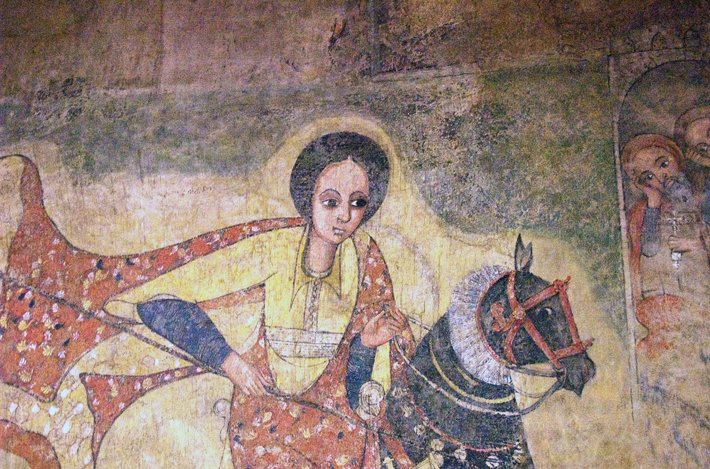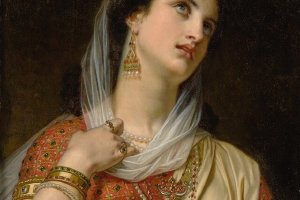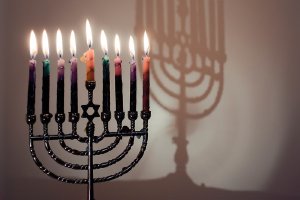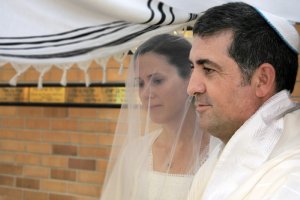Ethiopian Jews: Proof of the Beautiful Diversity That Is the Jewish People
I am black, but comely, O ye daughters of Jerusalem, as the tents of Kedar, as the curtains of Solomon.—Song of Solomon 1:5, King James Version

The legend goes that this verse refers to the Queen of Sheba who journeyed from her African home in present-day Ethiopia to Jerusalem to see for herself if the tales of the wise and generous King Solomon were true. She came, the Old Testament tells us, “With a very great retinue, with camels bearing spices, and very much gold, and precious stones”
(I Kings 10:2). And “she came to prove Solomon with hard questions,” all of which he answered to her satisfaction (II Chronicles 9:1-9).
The story, recounted as well in the Gospels of Matthew (12:42) and Luke (11:31) and in Coptic scripture, is nowhere more detailed than in the Ethiopian national saga, the Kebra Nagast (Glory of the Kings) wherein the Queen (named Makeda) and Solomon bear a child, and it is from that union that today’s Ethiopian Jews—also known as Beta Israel (“House of Israel”)—claim their bloodline and their heritage as Jews. That is the popular legend. There are others.
Origin stories notwithstanding, the Ethiopian Jews existed, lived, died, and endured persecution and banishment, just as their brothers to the north and the west. But, living a history entirely separate from the rabbinic history of the other branch of Jews, Beta Israel developed customs and traditions on a sometimes similar, sometimes widely different path of traditions and holy days.
One such is the festival of Sigd, occurring on the 29th day of the Hebrew month of Cheshvan, 50 days after Yom Kippur. “Sigd” means “prostration” in an ancient Ethiopian tongue. The holy day commemorates Moses’ first encounter with God at the burning bush, a meeting in the wilderness between a mortal and the Eternal at the very place where decades later the Children of Israel would confront the Divine at Sinai.
The holiday is marked by fasting, scriptural reading and prayer. At midday the fast ends with feasting and dancing.
Columnist Jeffrey Salkin quotes an Ethiopian Jew named Shula Mora, remembering Sigd: “Sigd celebrates our connection to Jerusalem; the entire village would go up the nearby mountain—men, women, and children—dressed in our best festive clothes for a day of fasting and prayer. The Kessoch, our religious leaders, read verses from the Torah and prayed for a return to Zion. On this day we also prayed for the release of the souls of the dead, sprinkling grains of wheat for birds to eat so they would fly our prayers to heaven. The holiday of Sigd is not only a gathering of the living, but also a day to remember and be reunited with those that have passed.”
Since 2008, the State of Israel has recognized Sigd as an official holiday, with celebrations for an entire month as a chance to raise awareness and visibility that there are Ethiopian Jews, that there is a community—Beta Israel—that is worth learning about, and that it’s been there all along—a jewel to be appreciated, included and respected. Out of all the gifts the Queen of Sheba presented Solomon, this was the greatest of them all.
_______________
From its beginnings, the Church of Scientology has recognized that freedom of religion is a fundamental human right. In a world where conflicts are often traceable to intolerance of others’ religious beliefs and practices, the Church has, for more than 50 years, made the preservation of religious liberty an overriding concern.
The Church publishes this blog to help create a better understanding of the freedom of religion and belief and provide news on religious freedom and issues affecting this freedom around the world.
The Founder of the Scientology religion is L. Ron Hubbard and Mr. David Miscavige is the religion’s ecclesiastical leader.
For more information visit the Scientology website or Scientology Network.


